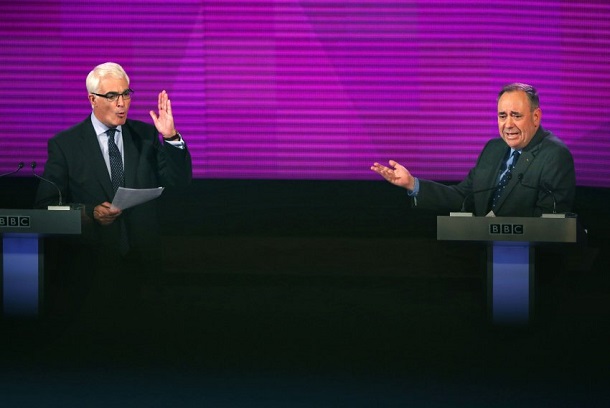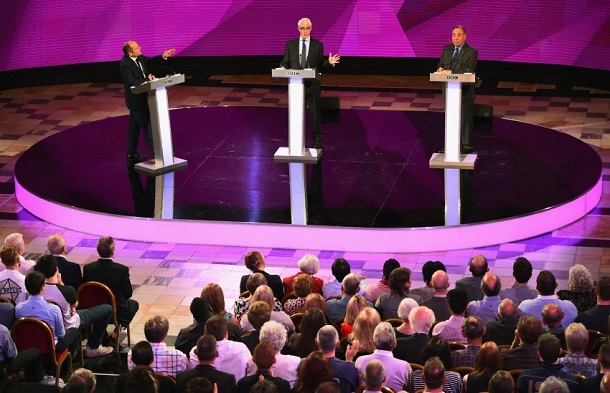The temperature in the Scottish independence debate rises: The second televised debate between separatist leader Alex Salmond and unionist Alistair Darling came to riot dialogue – with a clear winner.
In front of the Kelvingrove Museum in Glasgow a man stands in the blue double-breasted and has two small flags high, the Scottish and British. The university lecturer is flown in from London to demonstrate in front of the TV debate on Scottish independence for the United Kingdom. He looks around and sees only people with “Yes” signs. He is the only one who protested against the elimination of Scotland.
Similarly, Alistair Darling must feel this Monday evening. The frontman of the “Better Together” campaign, which advocates the preservation of Great Britain, is measured inside the separatist leader Alex Salmond. It’s the last TV debate before the referendum on 18 September. And always cheers the live audience in the magnificent Museum hall to his opponent.
The Yes camp is enthusiastic and more present, this much is clear. And Salmond dominates the stage, comes out from behind his lectern, looking close to the audience. The millions of the screens can be convinced of his show: In a first snap poll after the half-hour slugfest 71 percent elect him as the winner of the evening. The head of the Scottish Government is aggressive, quick-witted, optimistic. Darling, however, who had the better figure in the first televised debate in early August, stutters a lot and repeats.
It’s about the long-running issues of concern to the country for three years: the pound sterling, the North Sea oil, the Health Service. Salmond paints the picture of a wealthy country that will distribute its resource wealth more equitably. Darling contrast, sows doubt about that dream. Who will pay for this, he asks, if the oil is running out? And what currency will an independent Scotland have when London refuses a monetary union?
The very first question from the audience is a through ball for all skeptics: Is an independent Scotland financially secure? Darling recalls how he was able to save during the financial crisis, as a British Finance Royal Bank of Scotland. The small neighbors Ireland and Iceland were then gone bankrupt. Salmond, he warns the audience forfeits the future of children.
Scotland Independent Referandum TV Debate:”Do not Educate Me”

Unlike the first TV debate Darling can bring, this time by his counterpart from the rest. Salmond accused the Labour man, together with the hated Tories to privatize the health system to handle the shipbuilding on the Clyde and intimidate the Scots with a fear campaign. Passionate holds Darling against and tangled sheer outrage.
Sections of the debate comes to a howling hard. Both opponents fall into each others words and arguing loudly about individual numbers (“Educate me not” – “I know your numbers”). If they so aufführten in the pub, they were kicked out, says Fraser Nelson, editor of the conservative weekly magazine “The Spectator”: “It is impossible to follow their reasoning.”
The heated atmosphere shows that the D-day is approaching gradually. After three years of the pros and cons everyone crave the decision brought about. A tired-looking Darling speaks of “the longest campaign I have ever experienced”.
At the end of the debate, the two adversaries find conciliatory words. Salmond scores with a flourish: If the referendum is over, he says he will bring Darling in his negotiating team to achieve the best conditions for an independent Scotland in London. Then smite the hour of “Team Scotland”.
So far, however, it must come. The moderate success in TV debate should encourage the nationalists in the next three weeks until the referendum. However, a victory is unlikely. Add to surveys they are further behind. The balance of power is approximately 55 to 45 if you include the undecided.
For Salmond much is at stake. He has fought almost all his life for independence. If the referendum is lost, would be counted in politics his days.
[adrotate group=”14″]

